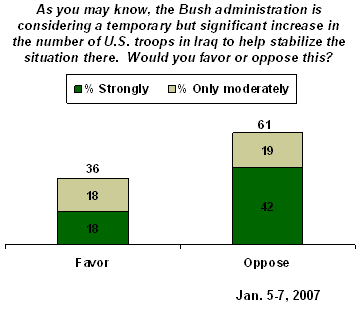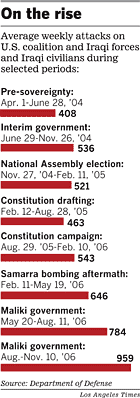Yeah, yeah, the President's speech. The only important parts (at least in Bush's mind) were the ones where he laid the groundwork for this:
From the BBC:
US forces storm Iranian consulate
US forces have stormed an Iranian consulate in the northern Iraqi town of Irbil and seized six members of staff.
The troops raided the building at about 0300 (0001GMT), taking away computers and papers, according to Kurdish media and senior local officials.
Ok, so if my
calculations are correct, if it's 3:00 am in Irbil (
GMT +3) when the raid took place then it was 7:00 pm the previous day in Washington (
GMT -5) at the time of the raid - just over two hours
before George W. Bush gave his speech.
Details are few, but this action changes the forcefulness, if not the nature of a later part of
Bush's Speech.
Iran is providing material support for attacks on American troops. We will disrupt the attacks on our forces. We will interrupt the flow of support from Iran and Syria. And we will seek out and destroy the networks providing advanced weaponry and training to our enemies in Iraq.
We are also taking other steps to bolster the security of Iraq and protect American interests in the Middle East. I recently ordered the deployment of an additional carrier strike group to the region.
We will expand intelligence sharing, and deploy Patriot air defense systems to reassure our friends and allies. We will work with the governments of Turkey and Iraq to help them resolve problems along their border. And we will work with others to prevent Iran from gaining nuclear weapons and dominating the region.
It also completely changes the way that I read 'The Surge.'
This 'Surge' isn't about securing Baghdad. This (along with the additional carrier group deployed to the gulf) is about showing Iran that despite having both feet firmly stuck in the Iraqi quagmire, we're still willing to bluster and bluff in the hopes of scaring the Iranians into doing what we want.
(More Evidence at
Unclaimed Territory.)
Here's the rub - You don't have to be a military expert to know that Iran's standing army isn't the push-over that Iraq's turned out to be. The Iranians know this and aren't likely to just roll over.
Nobody thought that the Neo-cons were
this stupid, but it's starting to look that way. Maybe they have decided that the next two years is the last chance they'll get. (The presidential election in 2008 - no matter which party wins - will most likely bring in an executive far less likely to engage in intervention and adventurism.) But then again, maybe they Neo-cons are just unhinged.
Most likely, I think they've realized that they've miscalculated on a grand scale. They selected Iraq as the target instead of Iran back at the beginning. Four years down the road, it's clear that Iraq wasn't a strategic threat to anybody. Iran
is. They're trying to turn around a bad situation that Neo-cons themselves made worse by refusing to admit a miscalculation years ago.
They're too proud to admit that they attacked the wrong country. To stubborn to admit that for all the blood and treasure expended, America (and the world) finds itself in a more dangerous position than it was before the invasion not least because it has created an unchecked power, Iran, in the Middle East.
Though the Bush Administration (or at least certain hard-line elements within it) would like to see the next two years shape up as a show down with Iran, my prediction is a show down of a different kind.
Constitutionally, the congress has the means to force a president to curtail a military operation. The congress simply stops allocating money to pay for the guns, fuel, food, and other supplies that the military needs to carry out the campaign while providing money to transport the troops and equipment back to the United States (or anywhere else.)
For congress to do this, exercise the power of the purse to end a war, requires incredible political will. Any congressperson voting to withhold funds will face accusations of a sin second only to Mark Foley's - not 'supporting the troops.'
In the face of these attacks (and you can be sure that BushCo's attacks will be swift and vicious) the only shield is public opinion. There needs to be overwhelming public support for ending the war to allow Senators and Representatives to go back to their constituents with this vote and feel that they can still win reelection.
And because George W. Bush is sure to veto any budget bill that requires he end his Iraqi Adventure, there needs to be a lot of Republicans that are willing to stand up and be counted among those voting to end the war.
Recent polls suggest that the majority of the public is leaning that way:
Most Americans oppose President Bush's call to send additional U.S. military forces to Iraq and just over a third say the new plan makes victory there more likely, an initial public rebuke of the strategy he unveiled last night in a nationally televised address.
A new Washington Post-ABC News poll conducted following the President's speech finds broad and strong opposition to his call to send about 21,500 more troops to Iraq: 61 percent oppose the force increase, with 52 percent "strongly" opposing the build-up. Thirty-six percent support the additional troops; only one-quarter of the public is strongly supportive.
That sounds good - but there's a problem. Most of the benchmark numbers - approval of Bush's handling of the war, Bush's approval rating, etc. - are very low, in the 30s, but stable. Among Republicans (and one would think especially among Republican Primary voters) support for the war is still nearly 75%.
As the New York Times notes, Bush has invited an '
epic clash' with congress that could be the most important test of our Constitution since Watergate. Only time will tell how it plays out.
On a separate note, let's examine the timing of this speech.
Democrats have regained power in the House and Senate for the first time in 12 years. They've embarked on a '100 Hour' legislative push to pass many measures wildly popular with the public - enacting recommendations of the 9/11 committee, a minimum wage increase, allowing the government to negotiate with drug companies for better prices, funding for stem cell research, etc. - only to see all their media attention disappear. Bush has again forced Democrats to respond to his actions and forced them to face the most contentious issue in the country and among the Democratic Caucus.
Nobody will be talking to Pelosi or Reid about the stem cell research bill scheduled for a vote today - it will be 'all Iraq, all the time' in Washington.
And all Bush had to do to regain control of the news cycle was send 20,000 Americans into somebody else's civil war...
War in Iraq Iran Consulate Irbil









